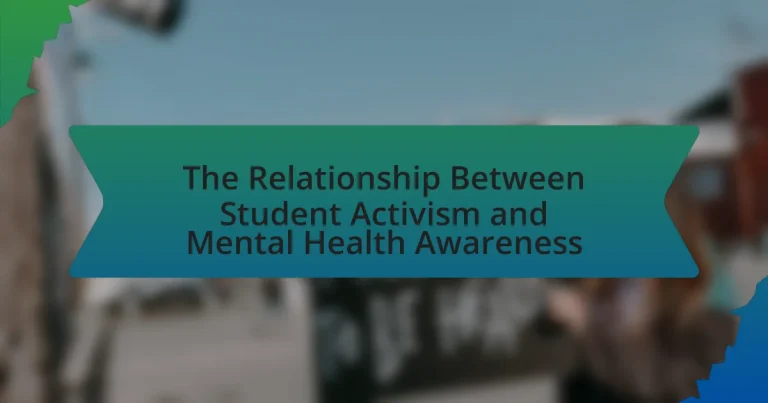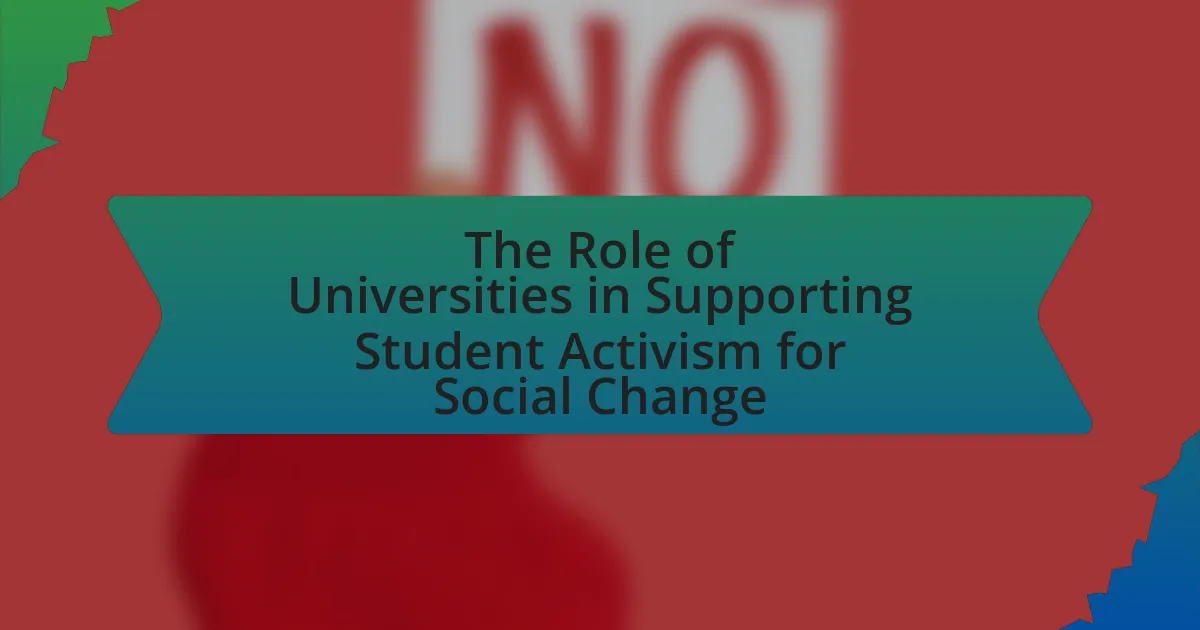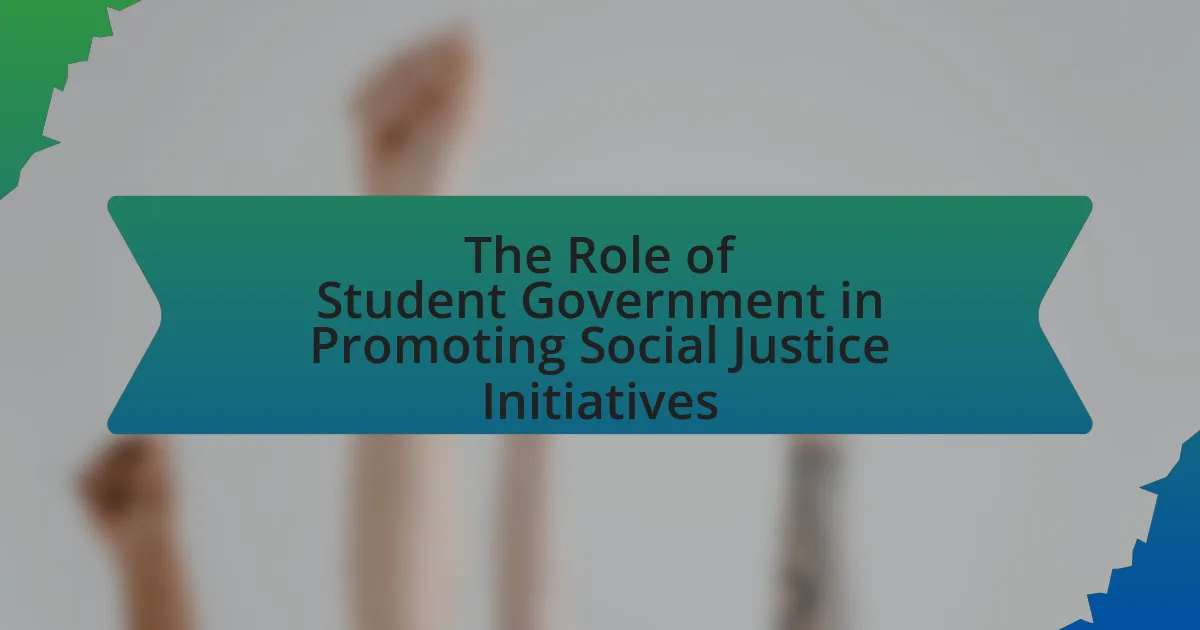The article examines the relationship between student activism and mental health awareness, highlighting how activism enhances awareness and reduces stigma surrounding mental health issues within educational institutions. It discusses the impact of student-led initiatives on peer engagement, the specific mental health challenges addressed by activists, and the importance of mental health awareness in fostering effective activism. Additionally, the article outlines the barriers faced by student activists, such as stigma and lack of resources, and emphasizes the positive outcomes of increased mental health awareness, including improved support systems and policy changes in mental health services on campuses.
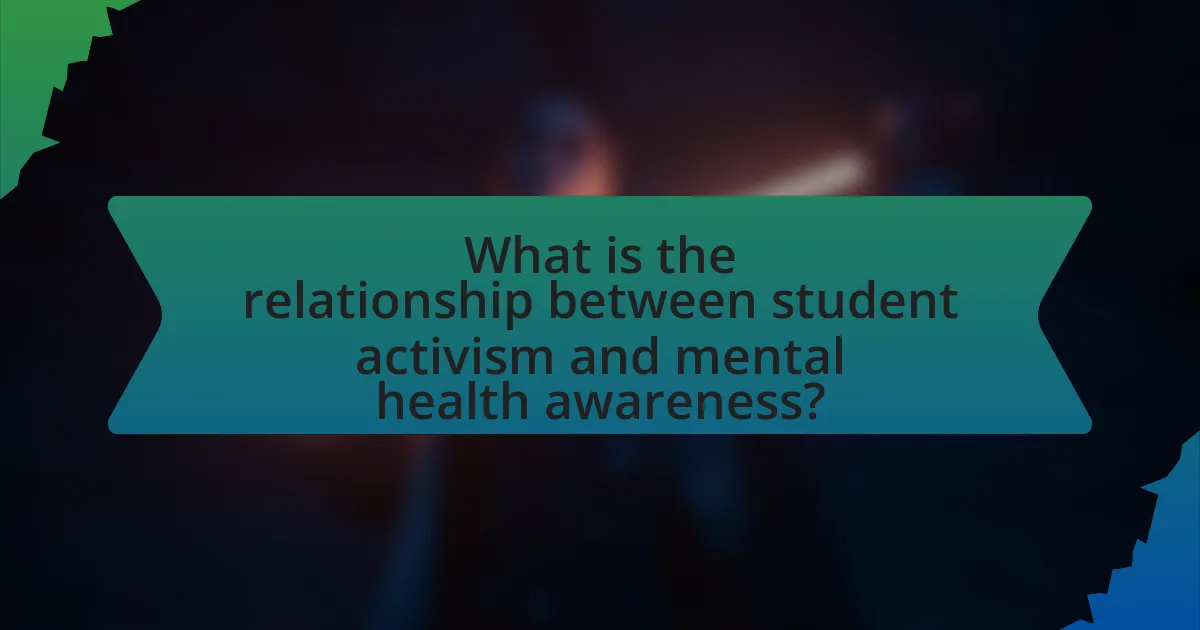
What is the relationship between student activism and mental health awareness?
Student activism significantly enhances mental health awareness among peers and the broader community. Activism initiatives often focus on destigmatizing mental health issues, promoting resources, and advocating for systemic changes in educational institutions. For instance, a study published in the Journal of American College Health found that student-led campaigns effectively increased awareness and utilization of mental health services on campuses, demonstrating a direct correlation between activism efforts and improved mental health literacy. Furthermore, engaging in activism can foster a sense of community and belonging, which are crucial for mental well-being, as highlighted by research from the American Psychological Association that links social support to reduced anxiety and depression among students.
How does student activism influence mental health awareness among peers?
Student activism significantly enhances mental health awareness among peers by fostering open dialogue and reducing stigma. Activist groups often organize campaigns, workshops, and discussions that educate students about mental health issues, encouraging them to share their experiences and seek help. For instance, a study published in the Journal of American College Health found that peer-led initiatives increased knowledge about mental health resources and reduced negative perceptions of mental illness among students. This collective engagement not only normalizes conversations around mental health but also empowers individuals to advocate for their own well-being and that of their peers.
What specific issues do student activists address related to mental health?
Student activists address specific issues related to mental health, including the stigma surrounding mental illness, access to mental health resources, and the need for mental health education in schools. They advocate for reducing stigma by promoting open discussions about mental health, which can lead to increased understanding and support among peers. Access to mental health resources is another critical issue, as many students face barriers such as high costs, lack of availability, and insufficient support services on campuses. Additionally, student activists push for comprehensive mental health education to ensure that students are informed about mental health issues, coping strategies, and available resources, thereby fostering a more supportive environment.
How do student-led initiatives promote mental health resources?
Student-led initiatives promote mental health resources by increasing awareness, reducing stigma, and providing peer support. These initiatives often organize events, workshops, and campaigns that educate students about mental health issues and available resources, fostering a supportive community. For example, a study published in the Journal of American College Health found that peer-led programs significantly improved students’ knowledge of mental health services and encouraged help-seeking behavior. By leveraging the influence of peers, these initiatives create an environment where mental health discussions are normalized, ultimately leading to greater utilization of mental health resources on campuses.
Why is mental health awareness important in the context of student activism?
Mental health awareness is crucial in the context of student activism because it directly impacts students’ ability to engage effectively in advocacy and social change. Activism often involves high levels of stress, emotional labor, and potential burnout, which can adversely affect mental well-being. Research indicates that students involved in activism may experience increased anxiety and depression due to the pressures of their commitments and the emotional toll of addressing social injustices. For instance, a study published in the Journal of American College Health found that 39% of college students reported experiencing significant anxiety related to their activism efforts. By promoting mental health awareness, educational institutions can provide necessary resources and support systems, enabling students to maintain their mental health while pursuing their activism goals. This support not only enhances individual resilience but also fosters a more sustainable and effective activist community.
What impact does mental health awareness have on student engagement in activism?
Mental health awareness significantly enhances student engagement in activism by fostering a supportive environment that encourages participation. When students are educated about mental health issues, they become more empathetic and motivated to advocate for causes that address these challenges. Research indicates that universities with strong mental health programs report higher levels of student activism, as students feel empowered to voice their concerns and support their peers. For instance, a study published in the Journal of American College Health found that students who participated in mental health awareness campaigns were 30% more likely to engage in activism related to mental health policies. This correlation underscores the importance of mental health awareness in mobilizing students to take action on issues that affect their well-being and that of their communities.
How can mental health awareness enhance the effectiveness of student activism?
Mental health awareness can enhance the effectiveness of student activism by fostering a supportive environment that encourages participation and reduces stigma. When students are educated about mental health, they are more likely to recognize the importance of self-care and community support, which can lead to increased engagement in activism. Research indicates that 75% of mental health issues emerge by age 24, highlighting the critical need for awareness among students. Furthermore, initiatives that promote mental health awareness can lead to improved resilience and coping strategies, enabling students to sustain their activism efforts despite challenges. This connection between mental health and activism is supported by studies showing that students who feel mentally supported are more likely to engage in social movements and advocacy efforts.
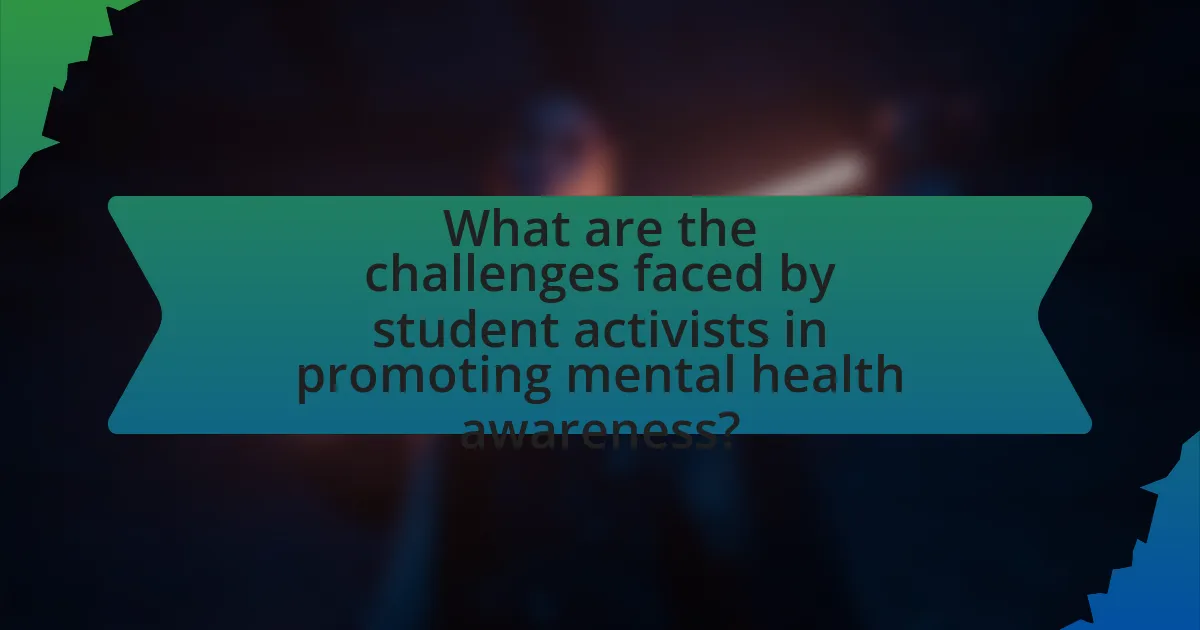
What are the challenges faced by student activists in promoting mental health awareness?
Student activists face several challenges in promoting mental health awareness, including stigma, lack of resources, and institutional resistance. Stigma surrounding mental health issues often leads to a lack of support from peers and administration, making it difficult for activists to engage the community effectively. Additionally, limited funding and resources hinder their ability to organize events, provide educational materials, and reach a wider audience. Institutional resistance can manifest as bureaucratic hurdles or a lack of prioritization of mental health initiatives, which can stifle activism efforts. These challenges collectively impede the effectiveness of student-led campaigns aimed at increasing mental health awareness on campuses.
What barriers do student activists encounter when addressing mental health issues?
Student activists encounter several barriers when addressing mental health issues, including institutional resistance, lack of funding, and stigma surrounding mental health. Institutional resistance often manifests as administrative pushback against proposed initiatives or policies aimed at improving mental health resources, which can hinder the effectiveness of activism efforts. Additionally, limited funding for mental health programs restricts the ability of student activists to implement comprehensive solutions, as many initiatives require financial support for resources, events, and outreach. Stigma surrounding mental health further complicates activism, as it can lead to a lack of engagement from peers and administration, making it difficult to foster an open dialogue about mental health needs and solutions. These barriers collectively impede the progress of student activists in promoting mental health awareness and support on campuses.
How do societal stigmas affect student activism related to mental health?
Societal stigmas significantly hinder student activism related to mental health by creating an environment of fear and silence around mental health issues. When students perceive mental health as a taboo subject, they are less likely to engage in activism or advocate for necessary changes, fearing judgment or social repercussions. Research indicates that 60% of students with mental health issues do not seek help due to stigma, which directly correlates with reduced participation in activism efforts aimed at raising awareness and promoting mental health resources. This reluctance to speak out perpetuates a cycle where mental health remains under-discussed and under-addressed within educational institutions, ultimately stifling the potential for impactful student-led initiatives.
What resources are often lacking for student activists focused on mental health?
Student activists focused on mental health often lack access to funding, training, and mental health resources. Funding is crucial for organizing events, campaigns, and outreach programs, yet many student organizations operate on limited budgets, hindering their ability to make a significant impact. Training in advocacy and mental health awareness is also frequently insufficient, leaving activists without the necessary skills to effectively communicate their message and engage their peers. Additionally, access to mental health resources, such as counseling services and informational materials, is often inadequate on campuses, limiting the support available for both activists and the student body they aim to help. These gaps highlight the challenges faced by student activists in promoting mental health awareness effectively.
How can student activists overcome these challenges?
Student activists can overcome challenges by building strong support networks and utilizing mental health resources effectively. Establishing connections with peers, faculty, and mental health professionals provides emotional support and practical advice, which is crucial for managing stress and burnout associated with activism. Research indicates that students who engage in supportive communities report lower levels of anxiety and depression (American College Health Association, 2021). Additionally, incorporating self-care practices, such as mindfulness and stress management techniques, can enhance resilience and maintain mental well-being. By prioritizing mental health and fostering a collaborative environment, student activists can navigate obstacles more effectively.
What strategies can be employed to raise awareness effectively?
To raise awareness effectively, targeted communication strategies should be employed, including social media campaigns, educational workshops, and partnerships with influential organizations. Social media campaigns can reach a broad audience quickly; for instance, a study by the Pew Research Center found that 69% of adults in the U.S. use social media, making it a powerful tool for disseminating information. Educational workshops can provide in-depth knowledge and foster discussions, which have been shown to increase understanding and empathy regarding mental health issues. Collaborating with organizations that already have a strong presence in the community can amplify the message, as evidenced by the success of initiatives like the National Alliance on Mental Illness, which effectively utilizes partnerships to enhance outreach and impact.
How can collaboration with mental health organizations enhance activism efforts?
Collaboration with mental health organizations can enhance activism efforts by providing expertise, resources, and credibility to initiatives aimed at raising awareness and addressing mental health issues. Mental health organizations often have established networks and data that can inform activism strategies, ensuring that campaigns are evidence-based and resonate with the target audience. For instance, partnerships can lead to the development of educational materials that accurately reflect mental health statistics, such as the fact that one in five adults in the U.S. experiences mental illness, according to the National Institute of Mental Health. This collaboration not only amplifies the message but also fosters a more informed and supportive community, ultimately leading to more effective advocacy and policy change.
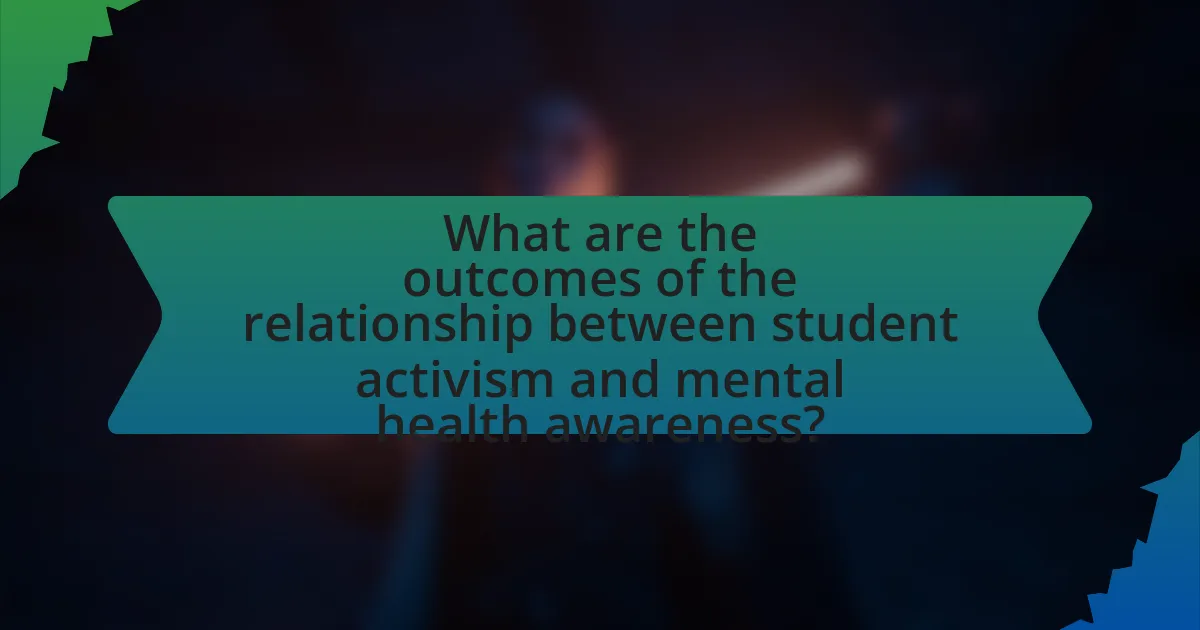
What are the outcomes of the relationship between student activism and mental health awareness?
The outcomes of the relationship between student activism and mental health awareness include increased visibility of mental health issues, enhanced support systems, and improved mental health resources on campuses. Student activism often leads to campaigns that raise awareness about mental health, resulting in a greater understanding of mental health challenges among peers and faculty. For instance, initiatives like Mental Health Awareness Week have been shown to foster dialogue and reduce stigma, as evidenced by studies indicating that participation in such events correlates with increased help-seeking behavior among students. Furthermore, activism can influence institutional policies, leading to the establishment of more comprehensive mental health services, which ultimately contribute to better mental health outcomes for the student population.
How does increased mental health awareness impact student communities?
Increased mental health awareness positively impacts student communities by fostering a supportive environment that encourages open discussions about mental health issues. This awareness leads to reduced stigma, enabling students to seek help without fear of judgment. Research indicates that institutions with robust mental health programs report a 30% increase in students utilizing mental health services, demonstrating that awareness initiatives effectively motivate students to access support. Furthermore, heightened awareness contributes to improved academic performance and overall well-being, as students feel more connected and supported within their communities.
What positive changes have been observed in student mental health due to activism?
Student activism has led to significant positive changes in mental health among students, including increased awareness, reduced stigma, and enhanced support systems. Activism initiatives have fostered environments where mental health discussions are normalized, allowing students to seek help without fear of judgment. Research indicates that participation in activism can improve emotional well-being by providing a sense of purpose and community, which are crucial for mental health. For instance, a study published in the Journal of American College Health found that students engaged in mental health advocacy reported lower levels of anxiety and depression compared to their peers who were not involved in such activities.
How does student activism contribute to policy changes regarding mental health?
Student activism significantly contributes to policy changes regarding mental health by mobilizing collective voices to advocate for systemic reforms. Through organized campaigns, protests, and awareness initiatives, students highlight the inadequacies in mental health services and demand improved resources and support systems. For instance, the National Alliance on Mental Illness reported that student-led movements have successfully influenced universities to adopt comprehensive mental health policies, leading to increased funding and access to counseling services. This activism not only raises awareness but also pressures policymakers to prioritize mental health in educational settings, resulting in tangible legislative changes that enhance student well-being.
What best practices can student activists adopt to promote mental health awareness?
Student activists can adopt several best practices to promote mental health awareness, including organizing educational workshops, creating supportive peer networks, and utilizing social media campaigns. Educational workshops can provide valuable information about mental health issues, helping to destigmatize them and encourage open discussions. Supportive peer networks foster a sense of community, allowing students to share experiences and resources, which can enhance emotional well-being. Social media campaigns can effectively reach a wider audience, raising awareness and encouraging conversations about mental health, as evidenced by studies showing that online platforms can significantly influence public perceptions and behaviors regarding mental health.
What role does social media play in student activism for mental health?
Social media serves as a crucial platform for student activism focused on mental health by facilitating communication, raising awareness, and mobilizing support. It enables students to share personal experiences, advocate for mental health resources, and organize events or campaigns that promote mental well-being. For instance, platforms like Twitter and Instagram have been instrumental in movements such as #MentalHealthAwareness, which has garnered millions of posts, highlighting the importance of mental health discussions among peers. Research indicates that social media can significantly increase engagement in mental health advocacy, with studies showing that 70% of young people believe social media helps them connect with others who share similar mental health challenges.
How can students effectively engage their peers in mental health discussions?
Students can effectively engage their peers in mental health discussions by creating safe spaces for open dialogue and utilizing peer-led initiatives. Establishing environments where individuals feel comfortable sharing their experiences fosters trust and encourages participation. Research indicates that peer support programs, such as those implemented in various universities, significantly enhance mental health awareness and reduce stigma, as evidenced by a study published in the Journal of American College Health, which found that 70% of participants felt more comfortable discussing mental health after engaging in peer-led discussions. Additionally, organizing workshops, seminars, and informal gatherings can facilitate these conversations, making mental health a normalized topic among students.
